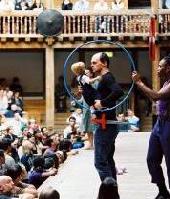SITE GUIDE
SEARCH
REVIEWS
REVIEW ARCHIVES
ADVERTISING AT CURTAINUP
FEATURES
NEWS
Etcetera and
Short Term Listings
LISTINGS
Broadway
Off-Broadway
NYC Restaurants
BOOKS and CDs
OTHER PLACES
Berkshires
London
California
New Jersey
DC
Philadelphia
Elsewhere
QUOTES
TKTS
PLAYWRIGHTS' ALBUMS
LETTERS TO EDITOR
FILM
LINKS
MISCELLANEOUS
Free Updates
Masthead
Writing for Us
A CurtainUp Review
Dido, Queen of Carthage
ç
|
If He forsake me not, I never die;
For in his looks I see eternity, And he'll make me immortal with a kiss. --- Dido |

Will Keen as Aeneas and Rakie Ayola as Dido onstage at Shakespeare's Globe
(Photo: Donald Cooper) |
So to carry through, the actors playing the Roman gods, Jupiter, Juno, Venus and Mercury, wear oversized clothes and shoes, think night-dresses, giant boas and huge sweaters rather than hip hop baggy trousers, as if they are children dressing up in adult garb. The girls parade around in large high heels, clopping on the wooden stage and holding enormous handbags. The cast hang off the climbing frame, swing on the swing and slide down the stainless steel slide which comprise the of kingdom of Carthage.
Many will be familiar with Virgil's Aeneid which is Marlowe's source for this tragic tale of the love story of Dido and Aeneas. After the Fall of Troy, Aeneas (Will Keen), Priam's son-in-law flees and is caught in a storm. Aeneas' mother, Venus (Clare Swinburne) ensures he lands safely in Carthage. Venus, using Cupid disguised as Aeneas' son Ascanius (voice by James Garnon), makes Dido (Rakie Ayola) fall in love with Aeneas so that he can repair his ships and sail to Italy. Dido rejects her many other suitors, including King Iarbas (Dave Fishley). Aeneas swears that he will never leave Carthage and Dido but the gods intervene and he breaks his word. Dido, unable to follow him, throws herself on a funeral pyre.
I was captivated by the love poetry of Marlowe's story, "his lips shall be my only library" and "It is Aeneas' frown that ends my days", although the production failed to find my inner child. Aeneas' account of the Trojan losses and the terrible loss of life has the power to move after hundreds of years. Dido, too, has some heart rending verse describing her predicament. She is the tragic heroine while Aeneas in stereotypical male fashion pursues the wishes of the gods, sails off into the sunset and gets on with founding Rome.
I did not warm to Ascanius and Cupid being played by an adult, James Garnon, with a child-like voice holding a doll to represent the children. How to play children is a perpetual difficulty in the suspension of disbelief and rarely overcome dramatically. Some of the movement and dance with hula hoops is imaginative and effective. I liked the hoops being used to show relationship connectivity. As Dido explains the many suitors she is giving up, Dave Fishley ascended the slide, stopping to pose in a hoop as if a portrait of each suitor. When Dido and Aeneas find each other in the cave, their union is celebrated by confetti of blowing bubbles.
Rakie Ayola is a stately and athletic Dido whose delivery of the poetry is exquisite. Some of Will Keen's verse was spoken against the persistent buzz of a police helicopter as an incident at Hungerford Bridge needed aerial support. It lent a certain irony to his speech about darkening skies. It reminds me that theatre at the Globe perpetually evolves to accommodate environmental interruption.
I shall repeat from the Globe's programme, the words of Daniel Hahn about the enigmatic Christopher Marlowe. Marlowe, a graduate of Cambridge University and thought to be involved with Francis Walsingham's spy ring, is presumed to have died in a Deptford guest house after an argument over the bill. The authorship of the plays of William Shakespeare is claimed by followers of Francis Bacon, Christopher Marlowe and others. "The Marlowe Society, the main backers for the Marlovian claim, depends on a belief that Marlowe did not die in 1593. Rather that he faked his own death, went into hiding, and continued to turn out plays which his undereducated friend Shakespeare offered the playing-company under his own name." The Globe this year admirably is presenting two of Marlowe's plays, Dido and Edward II. Their action in bringing the poet Marlowe to the attention of a wider audience is commendable.
Finally, some lines from Dido's emotionally charged and plaintive speech "
Why star'st thou in my face? If thou wilt stay,
Leap in my arms; mine arms are open wide;
If not, turn from me, and I'll turn from thee;
For though thou hast the power to say faewell,
I have not the power to stay thee."
For a production of this play by one of New York's most innovative Off-Off-Broadway companies go here
| Dido, Queen of Carthage
Written by William Shakespeare Master of Play: Tim Carroll Starring: Will Keen With: James Garnon, Clare Swinburne, Caitlin Mottram, Dave Fishley, Rakie Ayola Master of Design: Laura Hopkins Master of Music: Claire van Kampen Master of Dance: Sian Williams Master of the Words: Giles Block Master of Movement: Glynn MacDonald Master of Voice: Stewart Pearce Running time: Two hours ten minutes with one interval . Box Office: 020 7401 9919 Booking to 18th August 2003 Reviewed by Lizzie Loveridge based on 19th June 2003 performance at the Globe, New Globe Walk London SE1 (Tube Station: London Bridge/Mansion House via Millennium Bridge) |

Mendes at the Donmar
Our Review

Peter Ackroyd's History of London: The Biography

London Sketchbook

Somewhere For Me, a Biography of Richard Rodgers

At This Theater

Ridiculous!The Theatrical Life & Times of Charles Ludlam

The New York Times Book of Broadway: On the Aisle for the Unforgettable Plays of the Last Century

6, 500 Comparative Phrases including 800 Shakespearean Metaphors by CurtainUp's editor.
Click image to buy.
Go here for details and larger image.



